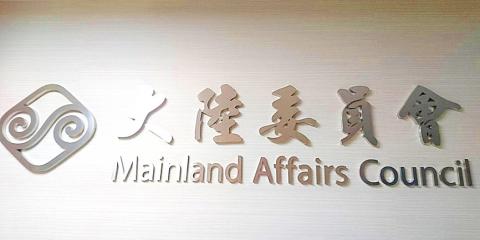Taiwan Democracy Watch yesterday voiced concern over the inking of a collaborative agreement between Pin Shang Credit Investigation Co (品尚徵信), based in China’s Fujian Province, and Taiwan’s China Credit Information Service Ltd (CCIS, 中華徵信所), saying that information held by the Taiwanese firm could be used by the Chinese credit investigation industry.
The two companies signed the agreement last month, according to a news release that month by China’s Taiwan Affairs Office.
The agreement allows credit investigation firms across the Taiwan Strait to use “big data” for applied research, development and merging of the cross-strait economy, the report said.

Photo: Chung Li-hua, Taipei Times
With support from CCIS, the People’s Bank of China’s Fujian branch has already conducted 310 investigations of Taiwanese corporations or individuals, it said.
Cross-strait collaboration on financial investigations is not legal, the Mainland Affairs Council said yesterday, citing a lack of comprehensive Chinese legislation about the industry and the desire to protect Taiwanese from having their financial information being used for other purposes.
The council said that according to its understanding, CCIS was only providing public information of domestic companies, such as corporate finances as listed by the Ministry of Finance’s Financial Data Center, or registration data.
Data on Taiwan’s Join Credit Information Center has been kept off-limits, the council said.
Collaboration between cross-strait financial investigation firms goes back at least two decades, serving as the basis for credit and insurance policies in China for Taiwanese businesspeople, CCIS vice chief executive officer Yu Chien-chug (余建中) said.
The EU Chamber of Commerce in China in a report in August said that Beijing has amassed a significant amount of data in preparation for the launch of its Social Credit for Corporations project next year.
Corporations would be assigned an economic and political rating, and corporate actions could be considered “harming national interest” under the system, the report said.
Should the system be established, Taiwanese businesses could be forced to support the so-called “1992 consensus,” Taiwan Democracy Watch chairman Sung Cheng-en (宋承恩) said.
The “1992 consensus,” a term former Mainland Affairs Council chairman Su Chi (蘇起) in 2006 admitted to making up in 2000, refers to a tacit understanding between the Chinese Nationalist Party (KMT) and the Chinese Communist Party that there is “one China,” with each side having its own interpretation of what “China” means.

NATIONAL SECURITY THREAT: An official said that Guan Guan’s comments had gone beyond the threshold of free speech, as she advocated for the destruction of the ROC China-born media influencer Guan Guan’s (關關) residency permit has been revoked for repeatedly posting pro-China content that threatens national security, the National Immigration Agency said yesterday. Guan Guan has said many controversial things in her videos posted to Douyin (抖音), including “the red flag will soon be painted all over Taiwan” and “Taiwan is an inseparable part of China,” while expressing hope for expedited “reunification.” The agency received multiple reports alleging that Guan Guan had advocated for armed reunification last year. After investigating, the agency last month issued a notice requiring her to appear and account for her actions. Guan Guan appeared as required,

A strong cold air mass is expected to arrive tonight, bringing a change in weather and a drop in temperature, the Central Weather Administration (CWA) said. The coldest time would be early on Thursday morning, with temperatures in some areas dipping as low as 8°C, it said. Daytime highs yesterday were 22°C to 24°C in northern and eastern Taiwan, and about 25°C to 28°C in the central and southern regions, it said. However, nighttime lows would dip to about 15°C to 16°C in central and northern Taiwan as well as the northeast, and 17°C to 19°C elsewhere, it said. Tropical Storm Nokaen, currently

PAPERS, PLEASE: The gang exploited the high value of the passports, selling them at inflated prices to Chinese buyers, who would treat them as ‘invisibility cloaks’ The Yilan District Court has handed four members of a syndicate prison terms ranging from one year and two months to two years and two months for their involvement in a scheme to purchase Taiwanese passports and resell them abroad at a massive markup. A Chinese human smuggling syndicate purchased Taiwanese passports through local criminal networks, exploiting the passports’ visa-free travel privileges to turn a profit of more than 20 times the original price, the court said. Such criminal organizations enable people to impersonate Taiwanese when entering and exiting Taiwan and other countries, undermining social order and the credibility of the nation’s

‘SALAMI-SLICING’: Beijing’s ‘gray zone’ tactics around the Pratas Islands have been slowly intensifying, with the PLA testing Taiwan’s responses and limits, an expert said The Ministry of National Defense yesterday condemned an intrusion by a Chinese drone into the airspace of the Pratas Islands (Dongsha Islands, 東沙群島) as a serious disruption of regional peace. The ministry said it detected the Chinese surveillance and reconnaissance drone entering the southwestern parts of Taiwan’s air defense identification zone early yesterday, and it approached the Pratas Islands at 5:41am. The ministry said it immediately notified the garrison stationed in the area to enhance aerial surveillance and alert levels, and the drone was detected in the islands’ territorial airspace at 5:44am, maintaining an altitude outside the effective range of air-defense weaponry. Following